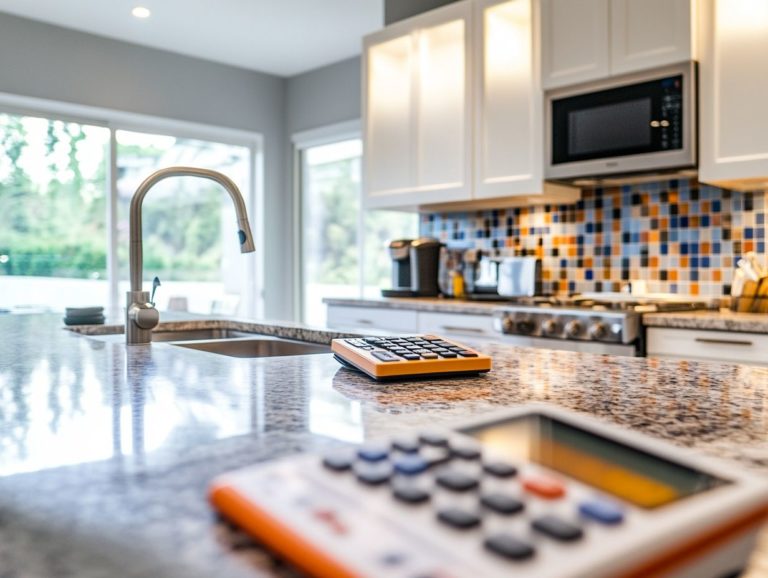5 Ways to Optimize Your Kitchen Budget
Managing your grocery budget might seem daunting, but rest assured, it doesn’t have to be a chore.
With a touch of planning and a strategic approach, you can stretch your dollars further without compromising on quality or flavor.
This article delves into five effective techniques to optimize your kitchen budget, covering everything from meal planning and bulk buying to savvy shopping and inventive cooking.
It also tackles essential questions regarding monthly spending, budget-friendly ingredients, and common pitfalls that you should steer clear of.
Immerse yourself in this guide and uncover how you can save money while savoring delightful meals!
Contents
- Key Takeaways:
- 1. Plan Your Meals and Make a Grocery List
- 2. Buy in Bulk
- 3. Use Coupons and Shop Sales
- 4. Cook at Home and Avoid Eating Out
- 5. Repurpose Leftovers
- How Much Should You Spend on Groceries Each Month?
- Frequently Asked Questions
- What are some ways to optimize my kitchen budget?
- How can meal planning help me save money on my kitchen budget?
- Why is shopping for sales and deals important for optimizing my kitchen budget?
- Is buying in bulk a good way to optimize my kitchen budget?
- How can cooking from scratch help me save money on my kitchen budget?
- What are some ways to repurpose leftovers to optimize my kitchen budget?
Key Takeaways:
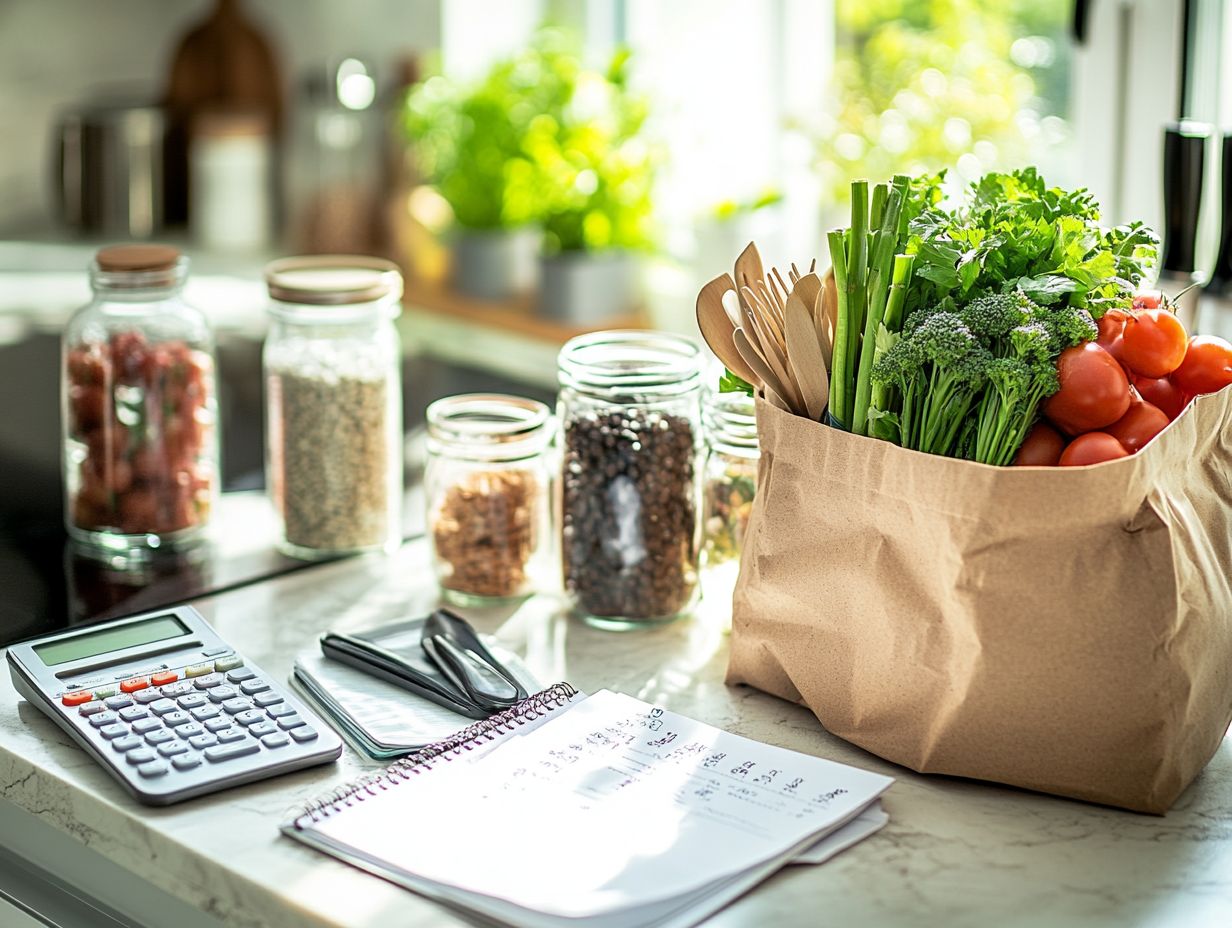
Plan your meals and make a grocery list to avoid overspending and wasting food.
Buying in bulk can help save money in the long run, especially for non-perishable items.
Utilize coupons and shop sales to get the best deals on groceries.
1. Plan Your Meals and Make a Grocery List
Planning your meals and crafting a detailed grocery list is essential for effective kitchen organization. This ensures you stay within your budget and minimize food waste.
By categorizing items based on meal types and nutritional needs, you can streamline your grocery shopping process, saving both time and money.
Use vertical space by stacking shelves or installing pegboards to maximize every inch of available storage.
Creative storage solutions, such as clear containers for pantry items or labeled bins for snacks, enhance visibility and simplify meal prep.
A well-organized kitchen creates a calmer cooking environment, making it easier for you to stick to your budget and reduces impulse purchases that could derail your financial plans.
2. Buy in Bulk
Buying in bulk is a savvy way to stock up on kitchen essentials, enabling you to save money while reducing grocery trips.
It’s a golden opportunity to stock up on non-perishable items, often available at discounted rates.
Focus on pantry staples like rice, pasta, canned goods, and beans and peas that are great for nutrition.
These items streamline meal preparation and ensure you’re well-prepared for unexpected guests or late-night cravings.
If you’re working with limited kitchen space, using smart storage solutions—like clear containers and stackable bins—can help keep everything organized and accessible, letting you enjoy the benefits of bulk buying without feeling overwhelmed.
3. Use Coupons and Shop Sales
Using coupons can help you save money quickly, allowing you to invest in quality appliances and fresh ingredients with ease.
Stay informed about the timing of sales events, such as seasonal discounts and holiday promotions.
Plan your shopping trips around these sales to stock up on essential pantry items at reduced prices.
Leverage online resources and apps to find similar deals, streamlining your shopping experience.
This approach not only makes it easier to acquire necessary goods but also promotes a well-organized kitchen, facilitating better meal planning and minimizing food waste—a win-win for anyone looking to elevate their culinary experience without straining their budget.
4. Cook at Home and Avoid Eating Out
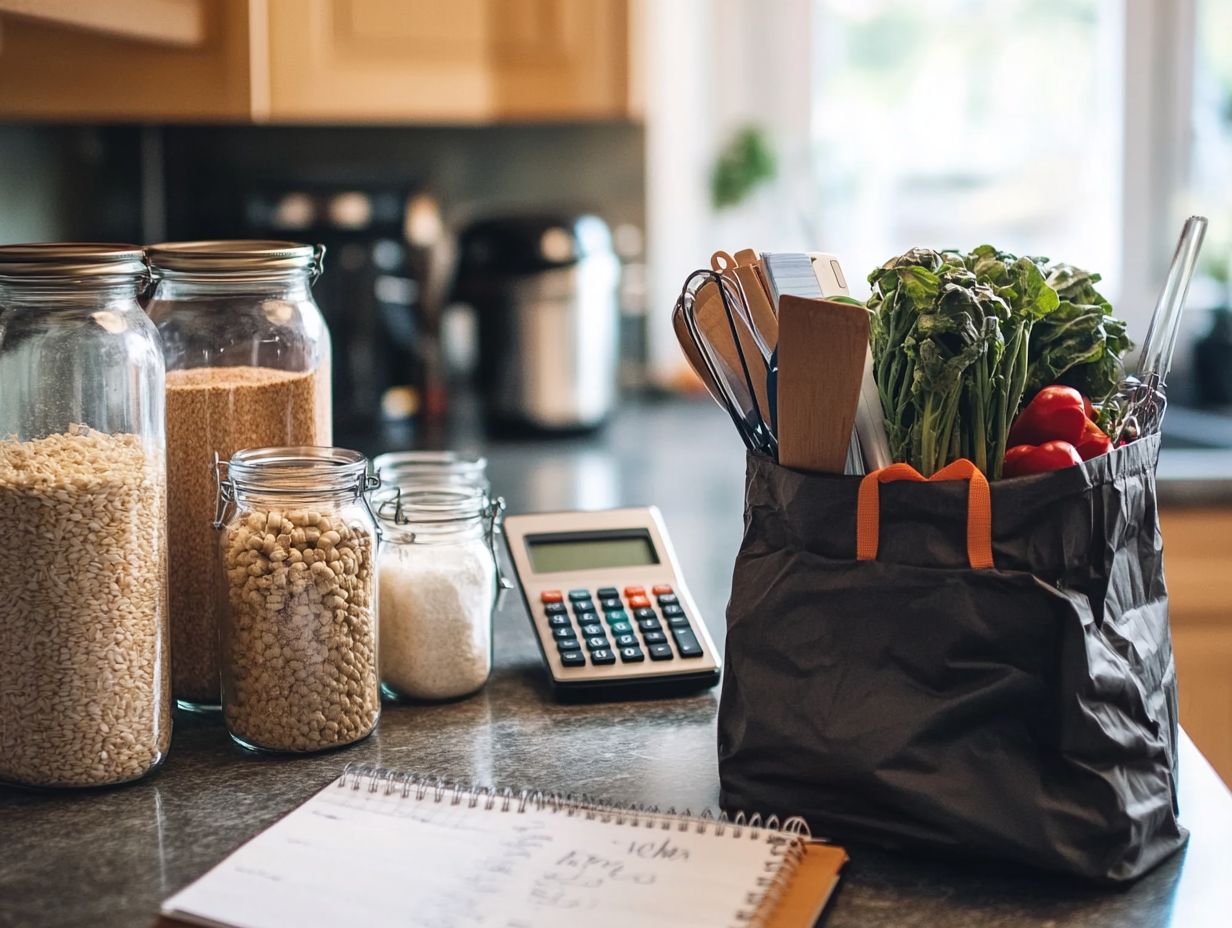
Cooking at home isn’t just a healthier option; it’s a great way to make your kitchen work better while keeping your budget intact. By avoiding the soaring costs of dining out, you can save money.
When you prepare meals at home, you have complete control over your ingredients. This ensures that only fresh, wholesome components go into your dishes, tailored perfectly to your dietary preferences. You can minimize unhealthy additives and preservatives while easily managing portion sizes.
Simple meal prepping means preparing meals in advance to save time during the week. Strategies like chopping vegetables ahead of time or batch cooking proteins can make cooking easier and less stressful.
A well-organized kitchen, with designated spaces for utensils and ingredients, allows even novice cooks to experiment and enjoy creating delicious meals from scratch.
5. Repurpose Leftovers
Repurposing leftovers is an elegant strategy that reduces food waste while infusing creativity into your kitchen. You can craft diverse meals without the added expense of grocery shopping.
Think outside the box and transform yesterday’s roast chicken into a vibrant soup or a satisfying stir-fry, breathing new life into familiar ingredients.
Utilize leftover vegetables in a colorful frittata or as toppings for homemade pizzas. This way, your meals are not just tasty but visually stunning as well.
To ensure maximum freshness, organization in your kitchen is essential. Use clear containers for easy identification and proper labeling to streamline your meal prep process.
Keeping your kitchen neat and inviting makes cooking more enjoyable. This enhances your resourcefulness, turning every leftover into a delightful opportunity.
How Much Should You Spend on Groceries Each Month?
Determining how much to allocate for groceries each month starts with evaluating your family’s needs and making informed choices about essentials and meal planning.
It’s essential to consider family size and dietary preferences to create a realistic budget. Larger families may need to stock up on more staples and fresh produce, while individuals with specific dietary needs might see varying grocery costs.
Track your expenses, whether using mobile apps or handwritten logs. This practice helps you adjust your spending when necessary. Act now to analyze your spending so you can avoid overspending next month. Every penny counts!
Planning your meals in advance and sticking to a shopping list can help you avoid sneaky impulse buys, ensuring that your grocery budget aligns more effectively with your actual consumption needs.
What Are the Best Ways to Save Money on Groceries?
There are several effective strategies you can employ to save money on groceries. These include smart shopping techniques, meal planning, and organizing your kitchen to use what you buy efficiently.
One of the best approaches is to buy seasonal produce. It’s fresher and often cheaper, supporting local farmers while allowing you to enjoy a variety of fruits and vegetables throughout the year.
Digital apps can help you track grocery savings, find the best deals, or even offer cashback on purchases. When combined with a well-organized kitchen, you can significantly reduce food waste.
Keep your ingredients visible and easily accessible to inspire creativity in your cooking. By implementing these tactics, you’re likely to see a noticeable drop in your monthly expenses.
How Can Meal Planning Help with Budgeting?
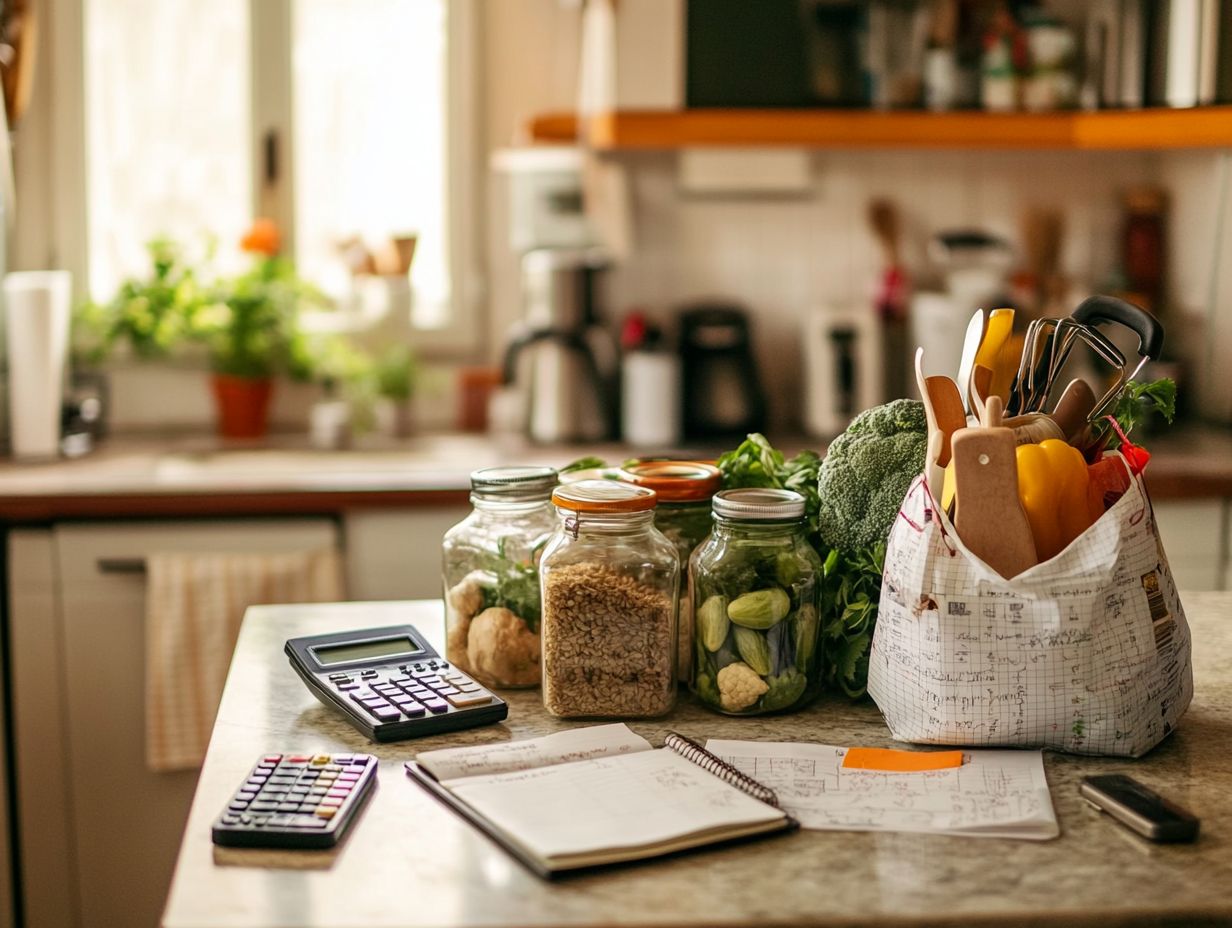
Meal planning is essential for budgeting. It helps you create a focused grocery list that aligns with your kitchen budget. This strategy keeps those pesky impulse buys at bay and ensures you use your resources wisely.
By adhering to a structured meal plan, you can accurately forecast your grocery expenses. This minimizes those unexpected costs that often throw your budget off course.
Utilizing meal planning templates like digital apps or printable calendars can greatly streamline this process. These tools help you organize meals for the week and track the ingredients you have on hand. This significantly reduces the likelihood of food waste.
You can incorporate strategies like cooking large amounts of food at once or tweaking recipes based on what’s already in your pantry. This enhances your kitchen organization and promotes a more efficient use of food and finances.
What Are Some Budget-Friendly Ingredients to Have on Hand?
Having budget-friendly ingredients at your fingertips can transform your cooking experience. It allows you to prepare nutritious meals while keeping your grocery budget in check.
Incorporating versatile staples like brown rice, quinoa, and lentils enables you to craft hearty dishes that satisfy your cravings without straining your wallet.
Seasonal vegetables—think carrots, spinach, and zucchini—bring a splash of color to your plate. They also introduce a delightful variety of flavors to explore. These ingredients transition seamlessly from vibrant salads to comforting soups, maximizing both their utility and deliciousness.
By embracing these essentials, you can whip up everything from satisfying stir-fries to wholesome grain bowls. This ensures your meals remain both exciting and economical.
How Can You Make the Most of Your Grocery Budget?
Making the most of your grocery budget requires strategic planning and kitchen organization. This allows you to maximize savings while providing healthy meals for your family.
One effective way to achieve this is by prioritizing your purchases based on what you already have at home and what’s on sale. For example, if beans happen to be on sale, think about incorporating them into multiple meals throughout the week—like a hearty chili or flavorful burritos.
Rotating your pantry items is a smart move that helps prevent food waste. Using older ingredients first can lead to delightful meals like a vibrant vegetable stir-fry or a quick pasta dish.
Meal planning not only streamlines your grocery shopping but also sparks creativity in the kitchen. This opens the door to budget-friendly meals, such as a simple rice and veggie bowl or a satisfying soup that stretches your ingredients and resources even further.
What Are Some Common Mistakes to Avoid When Trying to Save on Groceries?
When you’re looking to save on groceries, it’s crucial to recognize common mistakes that might sabotage your efforts. Neglecting meal planning or straying from your grocery list can lead to unnecessary expenses and wasted food, ultimately undermining your cost-saving ambitions.
For example, buying in bulk might seem like a savvy move, but without a solid plan, it often results in spoilage and a chaotic kitchen. Many shoppers overlook seasonal sales and miss out on chances to snag fresh produce at a fraction of the price.
To steer clear of these pitfalls, consider:
- Crafting meal plans that incorporate items you already have on hand.
- Sticking to a thoughtfully curated shopping list.
- Regularly reorganizing your kitchen for easy access to perishable goods.
This approach can help you maximize both your food budget and your resources.
Frequently Asked Questions
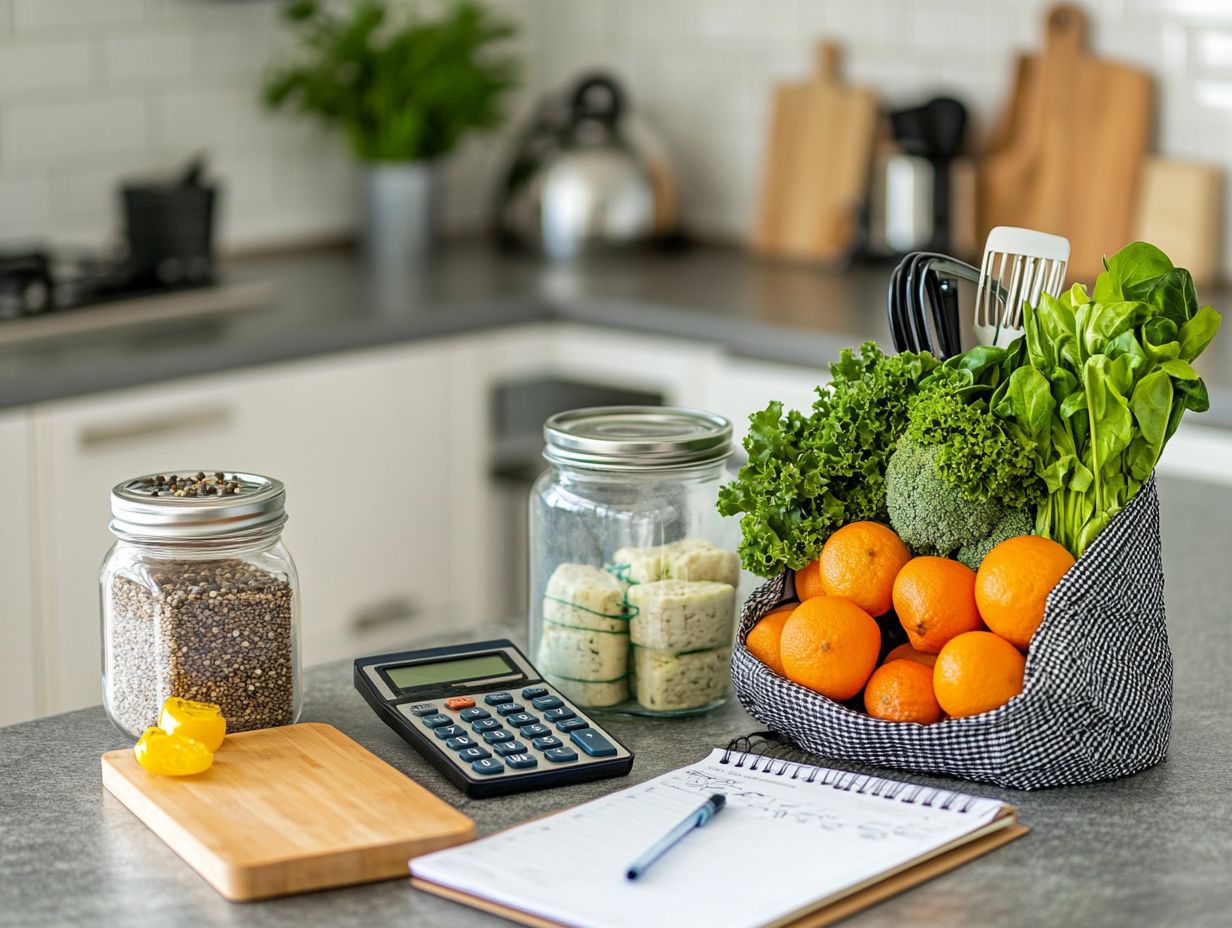
What are some ways to optimize my kitchen budget?
There are several ways to optimize your kitchen budget, including meal planning, shopping for sales and deals, buying in bulk, cooking from scratch, and repurposing leftovers.
How can meal planning help me save money on my kitchen budget?
Meal planning allows you to strategically plan your meals and grocery list. This helps you avoid impulse purchases and reduces food waste, ultimately saving you money in the long run.
Why is shopping for sales and deals important for optimizing my kitchen budget?
Shopping for sales and deals saves you money on ingredients and kitchen essentials. This lets you stretch your budget and stock up on items that might not be on sale again.
Is buying in bulk a good way to optimize my kitchen budget?
Buying in bulk can help you save on pantry staples and often-used ingredients. Just buy what you will use and have enough space to store it.
How can cooking from scratch help me save money on my kitchen budget?
Cooking from scratch is usually cheaper than buying pre-made meals. You control the ingredients, allowing healthier choices for your wallet and your health.
What are some ways to repurpose leftovers to optimize my kitchen budget?
Instead of wasting leftovers, turn them into new meals or use them in other dishes. This helps stretch your budget and cuts down on food waste.


